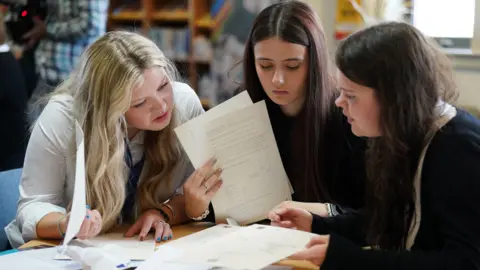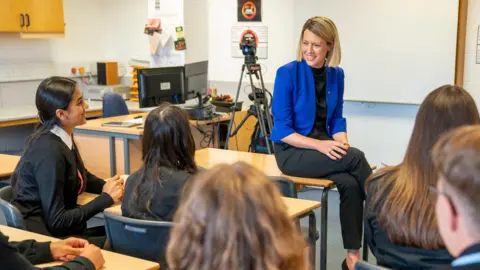Attainment gap widens in Scottish schools
 PA Media
PA MediaThe attainment gap between Scotland's richest and poorest school pupils increased last year, according to new figures.
The Scottish government has said since 2015 that closing this gap - between the level of national qualifications obtained by children from the most affluent and the least affluent areas - is its priority.
But the latest figures show the difference has widened for pupils sitting National 4s, National 5s and Highers.
The Scottish government said it was pleased that the vast majority of school leavers were going on to positive destinations such as college and university.
The attainment gap between the proportion of school leavers from the most and least deprived areas who had one pass or more in National 5s or equivalent qualifications was 22.7% last year – up from 20.2% in 2022/23.
The gap in the proportion of school leavers who achieved one pass or more in Highers or equivalent qualifications was 38.4% in 2023/24, up from 36.9% the previous year.
Education Secretary Jenny Gilruth told BBC Scotland News the statistics showed "positive signs for the future" despite the attainment gap increase.
The figures also show that 8,084 pupils left school after S4. That accounted for about one in seven of those leaving school, and was the highest number since 2010.
The proportion of pupils who left school last year with one or more pass at National 5s, or equivalent and one or more pass at Higher level or equivalent has also dropped.
Last year 83.5% of school leavers had one pass or more at National 5 level, while 57.4% had one pass or more at Higher level. Both were lower than in 2022/23.
'A deeper problem'
Prof Lindsay Paterson, from Edinburgh University, said the closure of schools during the Covid pandemic was one reason for the attainment gap getting worse in Scotland.
"Unlike in England and other countries, there has never been a proper programme of educational recovery here," he told BBC Scotland News.
"The harm is greatest to those children who have not been able to get help at home, or whose parents can't afford to pay for extra tutoring.
"But behind this is a deeper problem. The Scottish government has never had a coherent strategy for dealing with the educational effects of poverty."
He added that there was nothing intrinsically wrong with pupils leaving after S4 as long as they have something worthwhile to go to.
Just under 56,000 young people left school last year – the highest number since 2010.
More than 95% went on to positive destinations such as university, college, employment, some training and voluntary work. This was slightly lower than the previous year but one of the highest levels since 2010.
More than 67% of school leavers last year were in higher or further education three months later.
 PA Media
PA MediaGilruth told BBC Scotland News progress on closing the attainment gap was being made, but that the increase was "disappointing".
She said: "It is important to distinguish today's statistics on S4 leavers from overall progress made to close the attainment gap in Scotland.
"There are clearly positive signs for the future as we are seeing a record low poverty-related attainment gap in primary school literacy and in S3 literacy and numeracy.
"While it is disappointing that the attainment gap has widened slightly at SCQF Levels 4, 5 and 6, it's important to note that we have reduced the gap between the most and least deprived young people entering positive destinations by two thirds since 2009-10, the second lowest gap on record."
Gilruth added that the number of school leavers at S4 had remained stable, and that the government was exploring reasons why teenagers chose to leave school at that time.
Scottish Conservative education spokesman Miles Briggs said: "After years of insisting that education is their priority, the SNP have been missing in action while ministers have let down pupils and teachers at every turn.
"Under John Swinney's government, it's our most deprived students who now face the narrowest options and the worst prospects."
